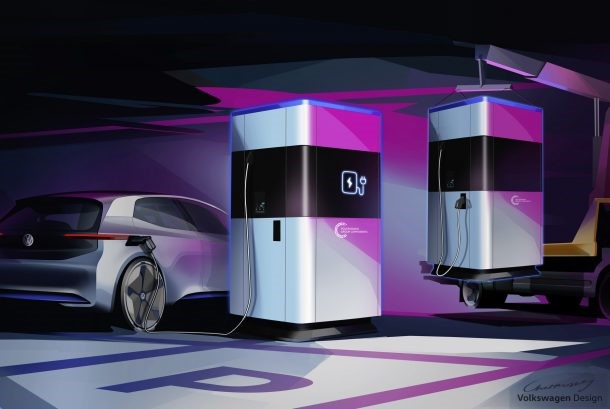VW’s Solution to EV Charging Woes: A Charging Station That Requires Recharging
 |
| Rendering of VW mobile charge station for places where high-voltage supply is not yet available |
Concerned that customers won’t buy vehicles from its upcoming electric product tsunami for fear of missing their turn at the plug, Volkswagen is offering a fairly novel solution: mobile charging stations that also require recharging, presumably from a much larger charging station. A power station, for example.
The takeaway from Volkswagen’s lesson in energy packaging is “Buy an electric Volkswagen. You’ll be fine."
As you’re no doubt well aware, VW wants vehicles built on its dedicated MEB electric architecture to populate every driveway and roadway in Europe and beyond. Possibly even bedrooms and kitchens, too. Setting a high bar for itself, the German automaker aims for one million annual MEB-platform vehicle sales by 2025, anticipating 10 million sales from the “first wave" of MEB products, spread out over 27 models from the automaker’s various divisions.
Production of the first MEB model, the VW I.D. hatchback, kicks off in earnest in 2020, with VW following it up with a multitude of introductions over the next two years.
As we’re only days away from 2019, the automaker has reason to worry about the limited proliferation of charging points. Something has to juice those cars, and it’s unrealistic to think every municipal parking lot and garage, every store and place of business, every roadside pull-out or gas station will have a proper amount of chargers installed in time to make VW’s lofty, green-tinged dreams come true.
Enter VW’s mobile quick charging station.
Revealed this week in VW’s home base of Wolfsburg, the refrigerator-like mobile charger could exist independent of the electricity grid, if needed, housing enough power (up to 360 kW) to charge “up to" 15 e-vehicles." Four EVs could charge at any one time — two on an AC hookup, two more on faster (100kW) DC plugs. Composed of the same vehicle battery packs it’s tasked with recharging, the first mobile stations appear in Wolfsburg as part of pilot project early next year. Come 2020, other German cities get theirs.
The key word here is “mobile." VW sees these units rolling out as either permanent fixtures or as-needed temporary stations for events. “This enables charging points for electric vehicles to be set up quickly and simply, without any structural changes or major financial outlay," the company writes.
“If the energy content of the integrated battery set is less than 20 percent, the depleted charging station is simply exchanged for a charged one," VW continues. “If, however, it is permanently attached to the power supply with up to 30 kW via alternating current, the battery pack perpetually recharges itself."
Where possible, a mobile station could be recharged specifically with renewable energy, such as from a wind turbine. The station could then be rolled out to wherever it’s needed for off-grid clean recharging. As well, stations recharging at off-hours would exert less stress on the country’s grid, reducing the need for extra peak-hour generation. Contrary to some reports, Germany still burns a lot of lignite (coal’s dirty brother).
When purchased by cities and companies, sales of the mobile stations would juice not just cars and e-bikes, but also VW’s finances, allowing the company to recoup some of the expense of its product rollout. However, the company didn’t dive into the details of exactly how it plans to make these stations available.
Mass production of the mobile stations begins in 2020. The Truth about Cars
